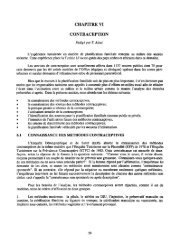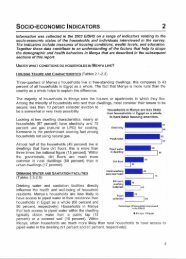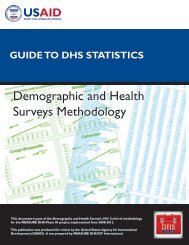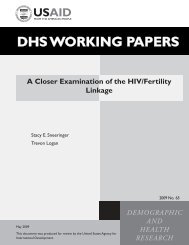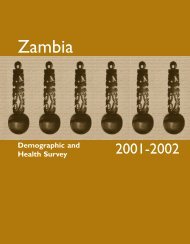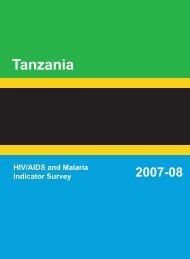Vietnam Population and AIDS Indicator Survey 2005 ... - Measure DHS
Vietnam Population and AIDS Indicator Survey 2005 ... - Measure DHS
Vietnam Population and AIDS Indicator Survey 2005 ... - Measure DHS
Create successful ePaper yourself
Turn your PDF publications into a flip-book with our unique Google optimized e-Paper software.
ATTITUDES RELATING TO HIV/<strong>AIDS</strong> 5<br />
5.1 KEY FINDINGS<br />
• While nearly all women <strong>and</strong> men report they would care for a family member with HIV at home,<br />
4 in 10 respondents would want the positive status of an HIV positive family member to remain a<br />
secret.<br />
• There is widespread acceptance of the ability of a woman to negotiate safer sex with her husb<strong>and</strong><br />
either by refusing to have sex or by requesting condom use if she knows he has a sexually<br />
transmitted infection.<br />
• Women <strong>and</strong> men who believe children should be taught about condom use to avoid HIV/<strong>AIDS</strong><br />
are in the minority.<br />
5.2 INTRODUCTION<br />
Not only has the HIV/<strong>AIDS</strong> epidemic emerged as a global problem with a disastrous impact on<br />
survival <strong>and</strong> human development, it has also instilled fear <strong>and</strong> social anxiety, often disseminating negative<br />
repercussions for those who contract the illness. This chapter presents measures of attitudes regarding<br />
HIV/<strong>AIDS</strong>. It includes indicators of stigma towards people living with HIV/<strong>AIDS</strong>, justifications for<br />
women negotiating safer sex with their husb<strong>and</strong>s, <strong>and</strong> attitudes towards teaching children about condom<br />
use.<br />
5.3 HIV/<strong>AIDS</strong>-RELATED STIGMA<br />
Stigma is a burden that many people living with HIV/<strong>AIDS</strong> carry in addition to their illness. The<br />
stigma is put upon them by others in society who label them as deserving of being marginalized. While<br />
the psycho-sociological basis for humans alienating each other is complex, the consequences for people<br />
living with HIV/<strong>AIDS</strong> who are stigmatized are clearly grave. Ultimately, a community, individual, or<br />
society that can rationalize the marginalizing of others can excuse itself from the responsibility of caring<br />
for <strong>and</strong> looking after those who have been marginalized.<br />
In order to assess the level of stigma, VPAIS respondents who have heard of <strong>AIDS</strong> were asked<br />
four questions related to their attitudes towards those infected with HIV/<strong>AIDS</strong>. Respondents were asked if<br />
they would be willing to care for a family member in their own household if that family member was sick<br />
with the <strong>AIDS</strong> virus. Respondents were asked whether they would buy fresh vegetables from a market<br />
vendor who had the <strong>AIDS</strong> virus. Respondents were asked whether they thought a female teacher infected<br />
with the <strong>AIDS</strong> virus who is not sick should be allowed to continue teaching in school. Respondents were<br />
asked to imagine if a member of their family got infected with the virus that causes <strong>AIDS</strong>, would they<br />
want it to remain secret or not. Tables 5.1.1 <strong>and</strong> 5.1.2 show the results.<br />
<strong>Survey</strong> results show that nearly all respondents (more than 9 in 10 women <strong>and</strong> men age 15-49<br />
who have heard of <strong>AIDS</strong>) say they would be willing to care for a family member in their own household<br />
who is sick with <strong>AIDS</strong>. However, only 5 in 10 women <strong>and</strong> men were able to say that the HIV status of an<br />
HIV positive family member need not be kept secret. Presumably, the 4 in 10 respondents (both women<br />
Attitudes Relating to HIV/<strong>AIDS</strong> | 43



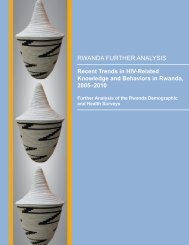

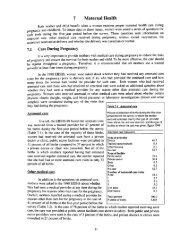


![Obtaining Informed Consent for HIV Testing [QRS4] - Measure DHS](https://img.yumpu.com/49850117/1/190x245/obtaining-informed-consent-for-hiv-testing-qrs4-measure-dhs.jpg?quality=85)

